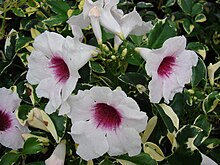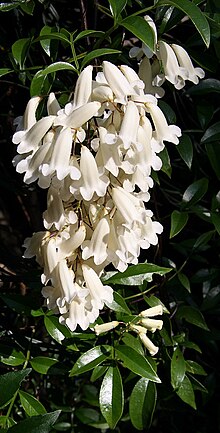| Pandorea | |
|---|---|

| |
| Pandorea jasminoides | |
|
Scientific classification
| |
| Kingdom: | Plantae |
| Clade: | Tracheophytes |
| Clade: | Angiosperms |
| Clade: | Eudicots |
| Clade: | Asterids |
| Order: | Lamiales |
| Family: | Bignoniaceae |
| Tribe: | Tecomeae |
| Genus: |
Pandorea ( Endl.) Spach [1] |
| Species | |
|
See text | |


Pandorea is a genus of nine species of flowering plants in the family Bignoniaceae and is native to Australia, Malesia, New Guinea and New Caledonia. Plants in the genus Pandorea are mostly woody climbers with imparipinnate leaves arranged in opposite pairs, flowers in groups with tube-shaped flowers, and winged seeds.
Description
Plants in the genus Pandorea are woody, evergreen climbers, rarely shrubs and have imparipinnate leaves arranged in opposite pairs and do not possess tendrils. The flowers are arranged on the ends of the stems or in upper leaf axils, sometimes appearing as racemes, each flower on a pedicel. The five sepals are fused at the base forming a bell-shaped or cup-shaped tube with short lobes. The five petals are joined at the base with two "lips" and there are two pairs of two stamens. The fruit is a capsule containing many flat, winged seeds. [2] [3] [4] [5]
Taxonomy
In 1838, Stephan Endlicher described the genus Pandorea, initially as a section of the genus Tecoma, in Édouard Spach's monograph Histoire Naturelle des Vegetaux. Phanerogames. [6] [7] [8] The genus name is a reference to Pandora of Greek mythology who opened a jar ( Pandora's box) releasing all the evils of humanity, alluding to the many-seeded capsules produced by species of Pandorea. [9]
Species list
The following is a list of Pandorea species accepted by Plants of the World Online as of October 2021: [10]
- Pandorea baileyana ( Maiden & R.T.Baker) Steenis – large-leaved wonga vine ( Qld., N.S.W.)
- Pandorea doratoxylon ( J.M.Black) J.M.Black (Qld., N.S.W.)
- Pandorea floribunda ( A.Cunn. ex DC.) Guymer (Qld., N.S.W.)
- Pandorea jasminoides ( Lindl.) K.Schum. – bower of beauty, bower vine, bower climber (Qld., N.S.W.)
- Pandorea linearis ( F.M.Bailey) Guymer (Qld.)
- Pandorea montana ( Diels) Steenis (New Guinea)
- Pandorea nervosa Steenis (Qld.)
- Pandorea pandorana ( Andrews) Steenis – wonga wonga vine ( Lesser Sunda Islands, Maluku, New Caledonia, New Guinea, N.S.W., Norfolk Island, N.T., Qld., Solomon Islands, Tas., Vanuatu, Vic.)
- Pandorea stenantha Diels (New Guinea)
References
- ^ "Pandorea". Australian Plant Census. Retrieved 11 October 2021.
- ^ Jeanes, Jeff A. "Pandorea". Royal Botanic Gardens Victoria. Retrieved 11 October 2021.
- ^ "Pandorea". State Herbarium of South Australia. Retrieved 11 October 2021.
- ^ "Pandorea". FloraBase. Western Australian Government Department of Biodiversity, Conservation and Attractions.
- ^ Quirico, Anna-Louise. "Pandorea". Royal Botanic Garden Sydney. Retrieved 11 October 2021.
- ^ "Tecoma sect. Pandorea". APNI. Retrieved 11 October 2021.
- ^ "Pandorea". APNI. Retrieved 11 October 2021.
- ^ Endlicher, Stephan (1838). Spach, Édouard (ed.). Histoire Naturelle des Vegetaux. Phanerogames. Vol. 9. Paris. p. 136. Retrieved 11 October 2021.
- ^ "Pandorea jasminoides". Australian Native Plants Society (Australia). Retrieved 11 October 2021.
- ^ "Pandorea". Plants of the World Online. Retrieved 11 October 2021.
External links
![]() Media related to
Pandorea at Wikimedia Commons
Media related to
Pandorea at Wikimedia Commons
| Pandorea | |
|---|---|

| |
| Pandorea jasminoides | |
|
Scientific classification
| |
| Kingdom: | Plantae |
| Clade: | Tracheophytes |
| Clade: | Angiosperms |
| Clade: | Eudicots |
| Clade: | Asterids |
| Order: | Lamiales |
| Family: | Bignoniaceae |
| Tribe: | Tecomeae |
| Genus: |
Pandorea ( Endl.) Spach [1] |
| Species | |
|
See text | |


Pandorea is a genus of nine species of flowering plants in the family Bignoniaceae and is native to Australia, Malesia, New Guinea and New Caledonia. Plants in the genus Pandorea are mostly woody climbers with imparipinnate leaves arranged in opposite pairs, flowers in groups with tube-shaped flowers, and winged seeds.
Description
Plants in the genus Pandorea are woody, evergreen climbers, rarely shrubs and have imparipinnate leaves arranged in opposite pairs and do not possess tendrils. The flowers are arranged on the ends of the stems or in upper leaf axils, sometimes appearing as racemes, each flower on a pedicel. The five sepals are fused at the base forming a bell-shaped or cup-shaped tube with short lobes. The five petals are joined at the base with two "lips" and there are two pairs of two stamens. The fruit is a capsule containing many flat, winged seeds. [2] [3] [4] [5]
Taxonomy
In 1838, Stephan Endlicher described the genus Pandorea, initially as a section of the genus Tecoma, in Édouard Spach's monograph Histoire Naturelle des Vegetaux. Phanerogames. [6] [7] [8] The genus name is a reference to Pandora of Greek mythology who opened a jar ( Pandora's box) releasing all the evils of humanity, alluding to the many-seeded capsules produced by species of Pandorea. [9]
Species list
The following is a list of Pandorea species accepted by Plants of the World Online as of October 2021: [10]
- Pandorea baileyana ( Maiden & R.T.Baker) Steenis – large-leaved wonga vine ( Qld., N.S.W.)
- Pandorea doratoxylon ( J.M.Black) J.M.Black (Qld., N.S.W.)
- Pandorea floribunda ( A.Cunn. ex DC.) Guymer (Qld., N.S.W.)
- Pandorea jasminoides ( Lindl.) K.Schum. – bower of beauty, bower vine, bower climber (Qld., N.S.W.)
- Pandorea linearis ( F.M.Bailey) Guymer (Qld.)
- Pandorea montana ( Diels) Steenis (New Guinea)
- Pandorea nervosa Steenis (Qld.)
- Pandorea pandorana ( Andrews) Steenis – wonga wonga vine ( Lesser Sunda Islands, Maluku, New Caledonia, New Guinea, N.S.W., Norfolk Island, N.T., Qld., Solomon Islands, Tas., Vanuatu, Vic.)
- Pandorea stenantha Diels (New Guinea)
References
- ^ "Pandorea". Australian Plant Census. Retrieved 11 October 2021.
- ^ Jeanes, Jeff A. "Pandorea". Royal Botanic Gardens Victoria. Retrieved 11 October 2021.
- ^ "Pandorea". State Herbarium of South Australia. Retrieved 11 October 2021.
- ^ "Pandorea". FloraBase. Western Australian Government Department of Biodiversity, Conservation and Attractions.
- ^ Quirico, Anna-Louise. "Pandorea". Royal Botanic Garden Sydney. Retrieved 11 October 2021.
- ^ "Tecoma sect. Pandorea". APNI. Retrieved 11 October 2021.
- ^ "Pandorea". APNI. Retrieved 11 October 2021.
- ^ Endlicher, Stephan (1838). Spach, Édouard (ed.). Histoire Naturelle des Vegetaux. Phanerogames. Vol. 9. Paris. p. 136. Retrieved 11 October 2021.
- ^ "Pandorea jasminoides". Australian Native Plants Society (Australia). Retrieved 11 October 2021.
- ^ "Pandorea". Plants of the World Online. Retrieved 11 October 2021.
External links
![]() Media related to
Pandorea at Wikimedia Commons
Media related to
Pandorea at Wikimedia Commons